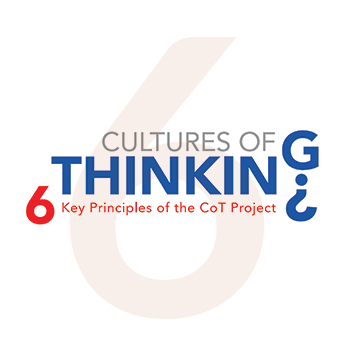
Six Key Principles of the Cultures of Thinking Project
PUBLISHED:AUTHORS: David Perkins, Ron Ritchhart
Resource Summary
1. Skills are not sufficient; we must also have the disposition to use them. Possessing thinking skills and abilities alone is insufficient for good thinking. One must also have the disposition to use those abilities. This means schools must develop students’ inclination to think and awareness of occasions for thinking as well as their thinking skills and abilities. Having a disposition toward thinking enhances the likelihood that one can effectively use one’s abilities in new situations.
2. The development of thinking and understanding is fundamentally a social endeavor, taking place in a cultural context and occurring within the constant interplay between the group and the individual. Social situations that provide experience in communicating one’s own thinking as well as opportunities to understand others’ thinking enhance individual thinking.
3. The culture of the classroom teaches. It not only sets a tone for learning, but also determines what gets learned. The messages sent through the culture of the classroom communicate to students what it means to think and learn well. These messages are a curriculum in themselves, teaching students how to learn and ways of thinking.
4. As educators, we must strive to make students thinking visible. It is only by making thinking visible that we can begin to understand both what and how our students are learning. Under normal conditions, a student’s thinking is invisible to other students, the teacher, and even to him/herself, because people often think with little awareness of how they think. By using structures, routines, probing questions, and documentation we can make students’ thinking more visible toward fostering better thinking and learning.
5. Good thinking utilizes a variety of resources and is facilitated by the use of external tools to “download” or “distribute” one’s thinking. Papers, logs, computers, conversation, and various means of recording and keeping track of ideas and thoughts free the mind up to engage in new and deeper thinking and help ensure that our thinking doesn’t get lost.
6. For classrooms to be cultures of thinking for students, schools must be cultures of thinking for teachers. The development of a professional community in which deep and rich discussions of teaching, learning, and thinking are a fundamental part of teachers’ ongoing experience provides the foundation for nurturing students’ thinking and learning.



-
-
-
-
-
-
Support PZ's Reach